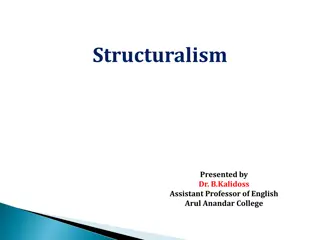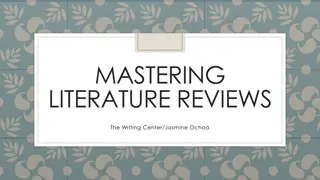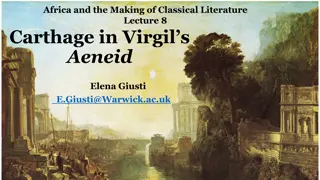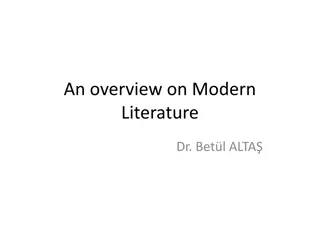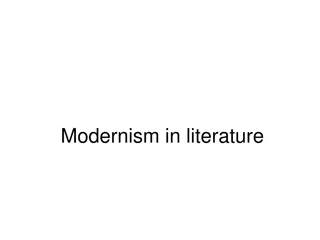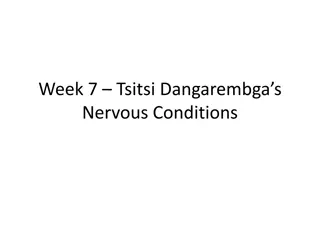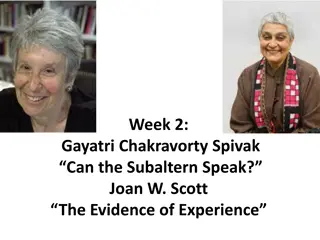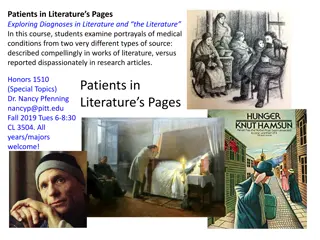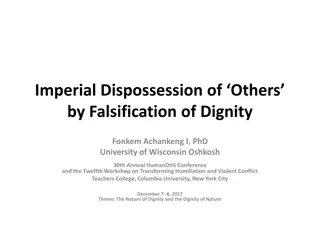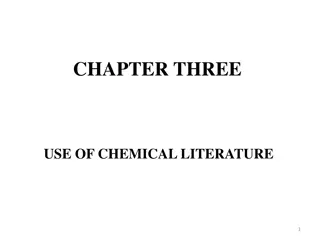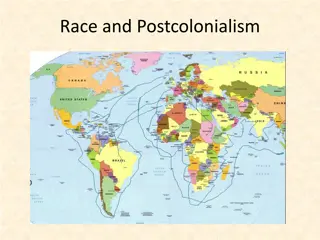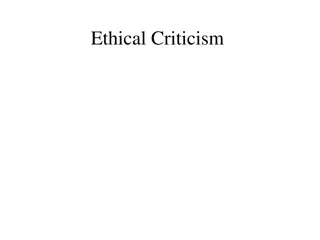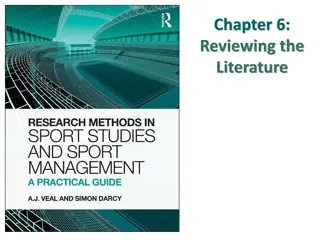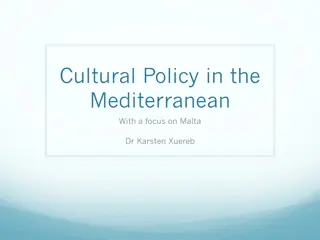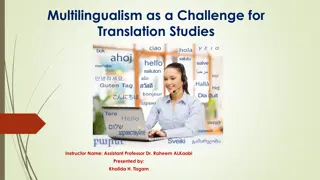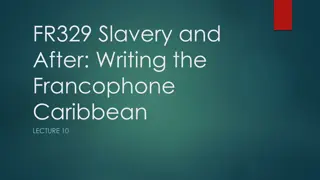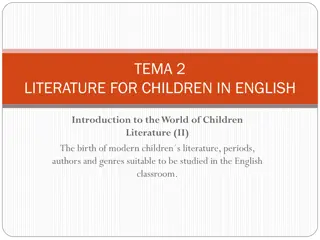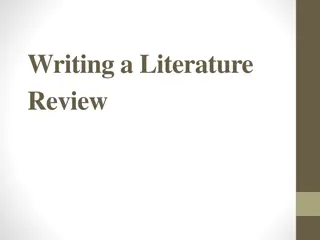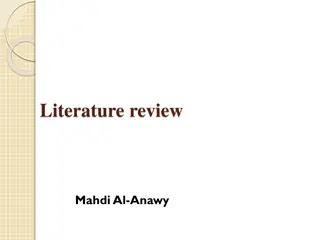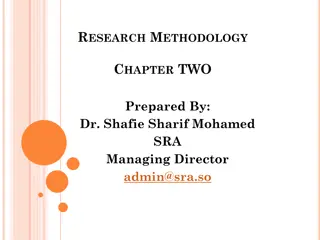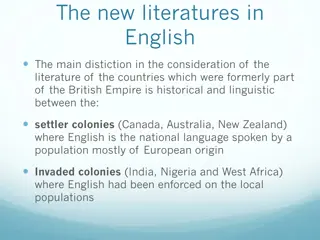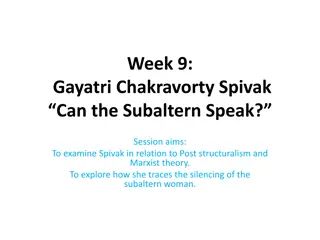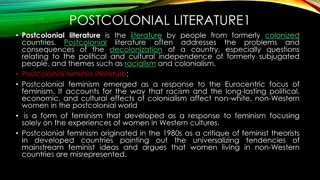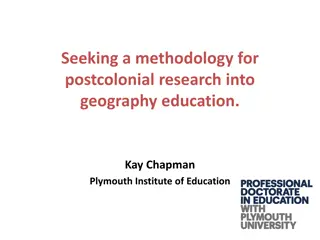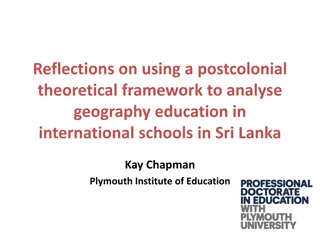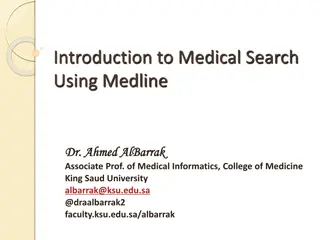Importance of literature review
A literature review is a critical component of any research endeavor, providing a comprehensive analysis of existing knowledge in a particular field. This review helps in clarifying conceptual issues, understanding research design, persuading examiners, and contributing new insights to the subject a
0 views • 28 slides
[PDF⚡READ❤ONLINE] In Ruins: A Journey Through History, Art, and Literature
\"COPY LINK HERE ; https:\/\/getpdf.readbooks.link\/1400030862\n\n[PDF READ ONLINE] In Ruins: A Journey Through History, Art, and Literature | In Ruins: A Journey Through History, Art, and Literature\n\"\n
1 views • 6 slides
Obscenity, Literature & Law
Delve into the interplay between obscenity, literature, and law, tracing the history of censorship in English law, landmark cases like the Lady Chatterley Trial, and the contemporary landscape of obscenity in legal frameworks. Discover the nuances of freedom of expression, diverse authorship in lite
0 views • 25 slides
LITERATURE REVIEW
Reviewing literature is a crucial aspect of research projects, allowing for a theoretical foundation and connection to practical applications. Steps involved include sourcing, careful reading, note-taking, theme identification, drafting, and revising. Discussions with colleagues can enhance the unde
2 views • 13 slides
Understanding Structuralism in Literature: Key Concepts and Evolution
Structuralism, as presented by Dr. B. Kalidoss, explores the order and arrangement in various forms like language and literature. It delves into the interrelationship between units and rules, proposing a deeper understanding of texts through linguistic analysis. The evolution of structuralism in lit
0 views • 17 slides
Mastering Literature Reviews: A Comprehensive Guide for Writing Success
A literature review is a critical discussion of relevant information on a specific topic, involving problem definition, interpretation, and identification of research gaps. It is not a mere collection of sources but a synthesis that guides further investigation. Incorporating APA style tips, this gu
1 views • 15 slides
Carthage: A Heterotopic Space in Classical Literature
Carthage, as depicted in Virgil's Aeneid and through artworks by Claude le Lorrain and J.M.W. Turner, is examined as a heterotopic space in classical literature. The concept of imagined geographies and heterotopias is explored in relation to Carthage, highlighting how it was represented, contested,
0 views • 31 slides
Evolution of Modern Literature in the 20th Century
The Modern Age in literature emerged in response to the Victorian era, marked by a shift in attitudes towards life and society. Influenced by historical, economic, and ideological factors such as World Wars, capitalism, and the disintegration of empires, Modern Literature explored new themes and sty
1 views • 14 slides
Exploring Modernism in Literature and Beyond
Modernism in literature emerged as a groundbreaking international movement in the early 20th century, challenging traditional norms and exploring new forms of expression. This movement, characterized by experimentation and a rejection of absolute knowledge, extended beyond literature into various fi
1 views • 17 slides
Effective Strategies for Literature Searches and Re-Use of Scholarly Literature
Conducting literature searches involves surveying existing publications and information on a specific topic. Different search strategies, from simple searches to systematic queries and snowballing, are utilized based on research needs. Learning objectives include building search strategies, using ad
3 views • 19 slides
Introduction to Isixhosa Language and Literature - Exploring Characters and Themes
This content provides an overview of Isixhosa as a first additional language (FAL) and delves into key aspects of literature such as character development and themes. It discusses the importance of characters in storytelling, emphasizing the significance of round and flat characters. The article als
3 views • 28 slides
Exploration of Gender and Sexuality in Tsitsi Dangarembga's "Nervous Conditions
Tsitsi Dangarembga's novel "Nervous Conditions" introduces a powerful narrative that focuses on the lives of young African girls and women in Zimbabwe during the postcolonial era. The novel challenges traditional gender roles and explores themes of sexuality, identity, and societal expectations. Thr
0 views • 11 slides
Critical Perspectives on Postcolonialism and Structuralism in Spivak's Work
Gayatri Chakravorty Spivak is known for her critical engagement with postcolonial theory and deconstruction, challenging traditional Western perspectives. By drawing on thinkers like Derrida and Foucault, Spivak offers a unique lens to interrogate power dynamics, hegemony, and resistance. Her work r
0 views • 31 slides
Comprehensive Literature Review Guidelines for Your Dissertation
Discover expert guidelines for conducting a thorough literature review in your dissertation. Explore topics such as literature search strategies, theoretical frameworks, review of the literature, synthesis, and analysis, with actionable tips provided throughout.
0 views • 11 slides
Exploring the Significance of Persian Language and Literature in Indian History
Persian language and literature hold a crucial place in Indian history, serving as a prime source for understanding the medieval period. Scholars in India have dedicated their lives to preserving and promoting Persian history, language, and literature. The rich cultural heritage of India, dating bac
0 views • 9 slides
Mastering the Literature Review Process
Understanding the significance of literature review, this guide emphasizes the essential steps involved in conducting a successful literature review - from planning and research problem identification to critical analysis and contribution to existing literature. It explains the importance of develop
0 views • 16 slides
Effective Strategies for Conducting Business Research Literature Review
This literature review provides insights into conducting business research effectively, covering topics such as how to search, read, and write literature reviews, along with the goals and types of literature. It emphasizes the importance of generating research ideas, demonstrating knowledge, and int
1 views • 13 slides
Exploring Diagnoses in Literature and the Literature
This course delves into portrayals of medical conditions in literature versus research articles. It explores the intersection of science and literature, analyzing works like "Black Swan Green" and "The Reason I Jump" to understand how they depict conditions like stuttering and autism. Through studen
1 views • 28 slides
Evolving Perspectives on Literature and Translation
Explore the intertwined relationship between national literature, comparative literature, and world literature, delving into the evolution of translation studies. Reflect on the shift from national literary histories to world histories of literature, highlighting the significance of world literature
3 views • 54 slides
The Politics of Representation in Postcolonial Studies
An exploration of the power of texts, literary criticism, and Orientalism as discourse, focusing on Edward Said and Stuart Hall's contributions. The discussion delves into how texts shape our understanding of the world and the implications of Orientalist representations on the East. The analysis hig
0 views • 17 slides
Understanding Imperial Dispossession through Falsification of Dignity
Exploring the concept of imperial dispossession through the lens of falsification of dignity, this academic work delves into colonial and postcolonial theories to analyze how portraying Others as incomplete or imperfect perpetuates the cycle of dispossession. The discussion touches on the implicatio
0 views • 12 slides
Understanding the Importance of Chemical Literature in Research
Reviewing chemical literature is essential in the research process to identify existing knowledge, develop hypotheses, plan methodologies, and discover unanswered questions. The vast and complex nature of chemical literature poses challenges in finding relevant information, especially with evolving
0 views • 22 slides
Understanding Postcolonialism and Its Impact on Literature Studies
Postcolonial theory delves into the influence of colonialism on literature and academia, emphasizing the shift in national identities post-colonization. This theory examines the dynamics of power, resistance, and cultural dominance in the context of British colonial history, highlighting the reactio
0 views • 19 slides
Exploring Ethical Criticism and Literature's Human Possibilities
Ethical criticism in literary studies revolves around the intersection of ethics, literature, and criticism. It tackles concerns about the relationship between value judgments, ethics, and aesthetics, emphasizing the importance of reconnecting criticism with moral principles. Literature offers a dee
0 views • 21 slides
Understanding the Importance of Literature Review in Research
Exploring the roles of literature in research, this content emphasizes the significance of reviewing existing literature to gather ideas, compare methodologies, and integrate supportive information. It also highlights the types of reviews and essential questions to consider during the literature rev
0 views • 12 slides
The Status of Literature in Secondary Schools of the O.E.C.S. - Research Findings by Dr. Anthony Felicien
Research by Dr. Anthony Felicien examines the status of literature in secondary schools of the O.E.C.S., focusing on the decline of interest in literature among students, influenced by historical curriculum changes and parental attitudes. The study highlights the importance of studying literature fo
0 views • 35 slides
Exploring Cultural Policy in the Mediterranean with a Focus on Malta
Delve into the intricate web of cultural relations in the Mediterranean region, centered around Malta. From historical and political insights to postcolonial influences and the role of cultural policy, this exploration sheds light on the complexities and nuances shaping the cultural landscape. Disco
0 views • 23 slides
The Impact of Multilingualism on Translation Studies
In a world embracing multilingualism, translators face new challenges when confronted with texts blending multiple languages. This phenomenon intertwines with translation, emphasizing the complex relationship between language, culture, and geography. Exploring literary multilingualism and its evolut
0 views • 24 slides
Complexity of Narrative Construction in Francophone Caribbean Literature
Exploring the intricacies of narrative construction in Francophone Caribbean literature, this lecture delves into the distinctions between fabula and syuzhet, the impact of authors' authority on storytelling, and the portrayal of Caribbean subjectivity and authority. Through examples from notable po
0 views • 11 slides
Evolution of Children's Literature in English: From Alice to Modern Times
Explore the birth of modern children's literature starting with the publication of "Alice's Adventures in Wonderland" in 1865 by Charles Dodgson (Lewis Carrol), marking a shift towards entertaining and engaging literature specifically for children. Prior to this, children mainly read folklore and ad
0 views • 35 slides
Mastering the Art of Writing Literature Reviews
Understanding the essence of a literature review, its descriptive and analytical components, selecting key articles, and finding relevant sources are essential steps in crafting a comprehensive literature review. By integrating ideas from various sources and highlighting crucial findings, a literatu
0 views • 18 slides
Comprehensive Guide to Literature Review Process
A literature review is essential before conducting research to identify existing information, gaps in literature, major works, and relationships between studies and theories. Follow steps such as defining the topic, sourcing information, discussing findings, and drafting to write an effective litera
0 views • 8 slides
Effective Strategies for Conducting a Literature Review in Research Methodology
Understanding the importance of literature review in research methodology, this chapter discusses the objectives, aims, and guidelines for writing a comprehensive literature review. It emphasizes the significance of identifying gaps in existing knowledge, structuring the review, and organizing infor
0 views • 33 slides
GCSE English Language and Literature Overview
GCSE English Language and Literature subjects are led by Mrs. A. Baker and Mr. Doodson. English Language is examined by OCR, while English Literature is examined by Edexcel. Both subjects have two examination papers worth 100% of the grade. English Language papers focus on reading and writing skills
0 views • 14 slides
The Evolution of Postcolonial Literature in English
The exploration delves into the evolution of postcolonial literature in English, contrasting the experiences of settler colonies and invaded colonies in adopting and adapting the English language. It discusses the impact of historical impositions and themes of identity, exile, and displacement acros
0 views • 15 slides
Reimagining Theoretical Boundaries: Spivak's Critical Perspectives
Gayatri Chakravorty Spivak challenges traditional categories by constantly revising her critical theories in response to societal changes. She explores the silencing of subaltern women, drawing on post-structuralist and Marxist ideas to question Western imperialism. Spivak's work reflects a dynamic
0 views • 26 slides
Exploring Postcolonial Feminist Literature in Former Colonized Societies
Postcolonial feminist literature emerged in response to the Eurocentric focus of feminism, highlighting the impact of racism and colonialism on non-Western women's experiences. Postcolonial societies navigate shifts in gender roles post-colonization, facing challenges of identity, double consciousne
0 views • 9 slides
Postcolonial Research in Geography Education: Methodology and Inquiry in Sri Lanka
Exploring postcolonial perspectives in geography education at British international schools in Sri Lanka. Investigating the impact of Western ethnocentric curriculum and international knowledge sharing on educational discourses and Othering practices. Research aims to analyze the production of geogr
0 views • 11 slides
Exploring Postcolonial Perspectives in Geography Education in Sri Lankan International Schools
Analysis of geography education in British international schools in Sri Lanka using a postcolonial theoretical framework to examine power dynamics, knowledge construction, and cultural representations. Focus on the impact of British English education as a marker of social status in Sri Lankan societ
0 views • 10 slides
Effective Medical Literature Search Techniques by Dr. Ahmed AlBarrak
Dr. Ahmed AlBarrak, an Associate Prof. of Medical Informatics at King Saud University, provides valuable insights on medical literature search using resources like Medline. The content covers objectives of literature search, methods to find relevant literature, advantages of electronic journals, and
0 views • 39 slides
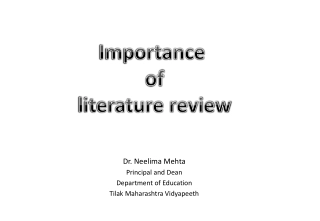
![[PDF⚡READ❤ONLINE] In Ruins: A Journey Through History, Art, and Literature](/thumb/20543/pdf-read-online-in-ruins-a-journey-through-history-art-and-literature.jpg)


